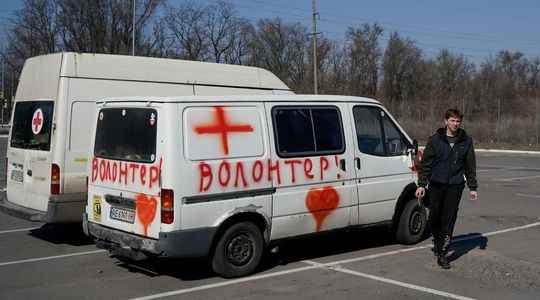The return is difficult. Voluntarily enlisted in the International Legion for the Territorial Defense of Ukraine, Luc (the first name has been changed) finally returned home a few days later, after having been close to death. On the night of March 13-14, the Yavoriv military base in which he had just started his training was bombarded by Russian strikes.
Since then, the 30-year-old has had to deal with a daily life “where everything is different”. His wife does not really forgive him for having put his life at risk for a country he does not know, and some of his relatives do not understand his commitment. However, this former firefighter, who worked for the French army for five years, affirms it loud and clear, “it was worth it”: “I went to fight for our values of freedom and fraternity, and I “I’m proud of it. The speech that this war is not ours was not understandable to me,” he said, referring to his “sense of duty”. “There is this principle of democracy that I wanted to defend. And, as such, I have no regrets,” concludes the former soldier.
Like him, some French people have put their professional and family life on hold to get involved in Ukrainian territory. “It is above all an intellectual and political commitment”, analyzes Florent Coury, one of the first Frenchmen to have joined the Georgian Legion, which fights in Ukraine. In a few weeks, this former HRD of a Renault factory became responsible for the selection of Western volunteers for this battalion and ensures, too, that he does not regret this choice. “We must restore the facts, be able to testify while being on the spot and say: ‘This is what it is to really fight for freedom and democracy'”, he argues, struck by the questioning of certain French people of their own democratic model.
“When I hear ‘Macron assassin!’ or ‘vaccine passport = dictatorship’, I have to remember that not everything is equal”, pleads the Frenchman. Above all, Florent Coury wishes to tell the story of these foreigners “who go to the front and may not return, with the sole aim of stopping Russia”. “If we accept this war without moving, it’s a red line that has been crossed. There is a limit that I could not let pass”, he adds, ready to accept the “reverse of the medal”. “Some members of my family don’t understand, it’s very complicated. But I know why I’m fighting.”
“Is it worth it”
An unlimited commitment that impresses Olivier Védrine, editor-in-chief of the Russian opposition newspaper Russian Monitor. This former professor at the University of kyiv does not however say he is surprised by such enthusiasm. “What is at stake today in Ukraine is the future of Europe. If this country falls, European values fall with it: perhaps this shock was needed to create a real commitment for our democracies” , he analyzes. Without necessarily taking up arms, some French people have also expressed their “click” in the face of the Russian invasion in Ukraine. “I could not sit idly by”, breathes Frédéric Herrmann.
This former soldier, now a firefighter in Alsace, set up in ten days a collective of 14 doctors ready to leave for Ukraine, in order to deliver medicines and set up a mobile hospital for war wounded. During its first trip, the team has already delivered 1.4 tons of medical equipment to the military hospital in Lviv, in the west of the country. But, already, Frédéric sees further, and says he is ready to go “deeper into the land” during his next delivery – despite the risks. “It’s worth it. We’re not doing it for ourselves, but for something bigger: what we’re defending is people, freedom, democracy,” says the firefighter, who has already sacrificed his holidays and invested several hundred euros in his project.
“As elected officials, it seemed important to us to react”, adds Naïma Sifer, secretary general of the Association of elected officials of France (AEF). In fifteen days, his organization set up a delegation of several local elected officials ready to go to Ukraine to deliver 6 tons of humanitarian material, organize cultural events in the refugee camps and sign a cooperation agreement with the city of Polyana. , located in western Ukraine.
“It is a gesture of great symbolic significance,” argues the delegation from its “bus for peace”, en route to the Ukrainian border. “What affects us is that the freedoms of Ukrainians are being jostled and compromised. From the moment these rights are affected, it was necessary to invest”, indicates Naïma Sifer, who affirms that she wants to commit herself “to the long term” with the city of Polyana. “Basically, it’s democracy we stand for. We couldn’t remain helpless.”
